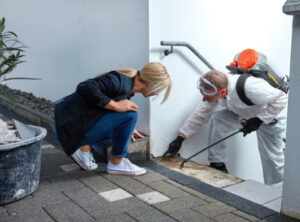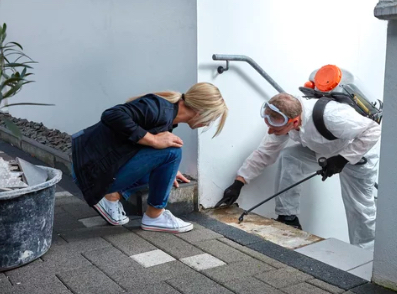 It’s every gardener’s nightmare: you’re enjoying your carefully tended plants, and suddenly, they are overrun by pests. Luckily, you have some household items that can treat unwanted pests safely and naturally.
It’s every gardener’s nightmare: you’re enjoying your carefully tended plants, and suddenly, they are overrun by pests. Luckily, you have some household items that can treat unwanted pests safely and naturally.
These homemade pest control essentials will help limit their populations, repel them, or confuse them so you can handle the problem more quickly and effectively. Visit https://www.rodentretreattexas.com/ to learn more.
Vinegar is a natural and effective deterrent to many common pests. It contains acetic acid that kills or dehydrates insects and arthropods, including mites, thrips, leaf hoppers, caterpillars and worms. The odor of vinegar is unpleasant to insects and can repel them from plants. It can also kill the eggs of certain critters. ACV can be used as a spot treatment to treat aphids, caterpillars and other insect pests. ACV can also be sprayed on vegetables and fruits to keep them clean.
ACV works as a homemade pesticide for indoor houseplants. Simply spray your houseplants with diluted apple cider vinegar to help control pests like mealybugs, aphids and spider mites.
Another homemade bug spray is made of equal parts water and liquid soap. This is a great homemade garden bug spray for tomatoes, peppers and other vegetables as well as flowers and fruit trees. Insecticidal soap exploits the fatty acids of soap to suffocate soft-bodied insects and arthropods, including aphids, mealybugs, thrips, leaf worms, whiteflies and spider mites.
If you have a problem with pesky fruit flies, try making a simple homemade trap by pouring a little apple cider vinegar in a small bowl or butter dish. Cover the container with plastic wrap and punch a few pencil-lead sized holes in the wrap. Fruit flies will zoom into the liquid for a sip but will be unable to get out again.
Homemade bug sprays can also include neem oil, which can be a great homemade garden bug spray for over 200 insect species. Neem oil has a chemical called azadirachtin that works as an adulticide, pesticide and fungicide. It is safe around pets and children when used properly.
Plant herbs in your garden to naturally repel pests and improve your harvest. Chives are a tasty addition to potatoes, eggs and soups, but they also stave off aphids and mites. Try planting chives around squash and other vegetables to keep the pests away. Dill, another herb used in a wide variety of dishes, keeps hornworms and tomato horn maggots at bay, as well as spider mites. The pungent scent of tansy masks the smell of some fruits, including apples and pears, to deter fruit flies. And the leaves of feverfew are said to repel aphids and mites.
Another common kitchen herb that has natural insecticidal properties is rosemary. The fragrant herb’s oil contains a compound called thymol, which has been shown to help repel mosquitoes, as well as flies and other insects. Citronella, an ingredient often found in store-bought mosquito sprays, is another effective herb for warding off pesky flies and mosquitoes.
A popular homemade bug spray is made with water, soap and garlic. It’s easy to make and can be used on a wide range of plants and other items in the home or garden. But, as with any pest control spray, be sure to do a patch test before applying to your plants. A patch test means spraying a small amount of the solution on a few leaves of a plant and waiting 24 hours to see if it causes any damage.
For an all-around garden bug spray, mix equal parts of garlic and cayenne pepper powder with water in a plastic container. Then, add in two teaspoons of mineral oil. To use, shake the mixture and apply generously to your plants or other items in need of protection. This homemade insect spray works quickly to kill or repel insects and will not harm indoor air quality.
Garlic spray can be used to repel both insects and larger critters like groundhogs, deer, rabbits and moles. It can be used on a variety of plants including tomatoes, peppers, squash, eggplants and cucumbers. Garlic is a natural insecticide that has been shown to interfere with the sensory receptors of some bugs, such as potato bugs and aphids. It will also help to repel ground beetles, grubs and other garden pests that chew holes in leaves and stems of plants. This homemade spray is a good alternative to commercial bug products that contain toxic chemicals.
Mix 2 cups of water with cloves of peeled garlic in a large jar. Let sit overnight and then strain mixture into a clean spray bottle. Add a few drops of lemon juice and a little eucalyptus or tea tree oil for added effectiveness.
Spritz the mixture on and around your plants a few times a week. The garlic smell will not bother people, pets or animals but it will discourage aphids, hornworms, cutworms, slugs and other garden pests. This spray is especially effective on tomato and pepper plants. It will also repel slugs and snails, which are a serious problem for these vegetables. It can be used on any type of leafy plant as well as herbs and flowers, although the garlic may prevent pollinators from visiting those types of blooms.
Aside from being effective against common garden pests, this homemade spray stimulates growth and encourages a strong root system. It is safe for people, pets and wildlife and is an excellent substitute to chemical plant sprays that can harm beneficial insects. It can be sprayed on roses, flowers, fruit trees and shrubs as well as houseplants. During a trial at the Royal Horticultural Society garden in , roses that were sprayed with this mixture grew TWICE as large and were much more resistant to fungal diseases such as blackspot and mildew.
A homemade chili pepper spray will not only keep aphids and other insects away from your plants but it can also repel deer, rabbits, chipmunks, squirrels, and other animals that might raid your garden. The capsaicin in cayenne, jalapeno, or other peppers causes the animals to experience a burning sensation when they come in contact with the spray. If applied consistently, the animals will learn that your garden is no place to visit and will move on to another location where your veggies, flowers, and greenery are free from their hungry appetites.
This spray can be used on any plant, flower, or vegetable that you want to protect from animal pests. The key to this recipe is that you must continually re-apply it as the animals will try again and again to get to your food sources. The pepper spray is easy to make and uses ingredients that you already have on hand. If you have a large garden or are protecting many plants, you may need to use a larger tank sprayer or backpack sprayer to apply the mixture.
It is important that you wear gloves when working with this mixture and always be cautious not to get the spray in your eyes. The peppers and garlic will irritate your skin, eyes, and throat, and can cause coughing, sneezing, and temporary blindness.
When making your pepper spray, be sure to use only the hottest peppers available. Pepper sprays are rated by their MC (major capsaicinoids) percentage, not their OC or SHU percentages. Be sure to read the specifications on the product you purchase to find out what MC percent it contains, as that is the only true measure of hotness.
Dust mites may look like they come from outer space, but they’re a very real problem that can cause allergies and breathing problems. These microscopic creatures are close relatives of ticks and spiders and are found in every home. These pests live in areas of high humidity – typically above 60% — and feast on the flakes of dead skin and dander shed by humans and their pets. They also eat things like pollen, molds, animal dander and fungus.
Fortunately, there are several natural ways to control them, including the use of diatomaceous earth (available as a powder at most hardware stores). This fine powder can be sprinkled on surfaces where mites live and will pierce their exoskeleton, killing them instantly. It can also be used on rugs, mattresses and furniture. Just be sure to vacuum afterward to remove the mites and their carcasses.
Another effective method is to spray fabrics with a natural anti-dust mite spray. Mix one ounce of Bithor per gallon of water and apply to beds, sofas, rugs and other fabrics that can get wet. The spray will kill the mites and prevent them from reproducing, which helps alleviate allergy symptoms.
For the best results, apply this spray to all fabrics at least once a week. Do this after washing linens and before sleeping, or whenever you’re changing the sheets. The spray is also a good idea to apply on upholstered furniture, carpets and pillows. If you have a pet, be sure to spray their bedding and stuffed animals as well. You can also use a dehumidifier to help keep humidity in check. For a more convenient option, consider purchasing an ERADICATOR mattress and fabric treatment that does the work for you. It uses a blend of natural essential oils that’s safe for people and pets to eliminate the bugs without toxic chemicals.

